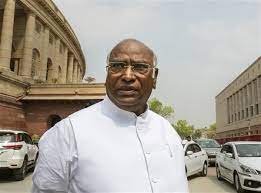In a recent development, Hitesh Bhardwaj, the founder of the Hindu Suraksha Parishad Bajrang Dal Hind, has filed a defamation case against Mr. Kharge, a prominent political figure, over alleged defamatory remarks made against the Bajrang Dal. The lawsuit stems from comments made by Mr. Kharge during a public address, where he purportedly made derogatory statements about the organization. The legal battle has drawn attention and raised important questions surrounding freedom of speech, defamation laws, and the responsibilities of public figures.
The Bajrang Dal is a right-wing Hindu nationalist organization in India that claims to work towards the protection of Hinduism and the preservation of Hindu culture. Founded by Hitesh Bhardwaj, the group has been involved in various social and political activities. However, it has also faced criticism for its alleged involvement in religiously motivated violence and vigilantism.
A public speech at a political rally, Mr. Kharge reportedly made comments that were perceived as defamatory towards the Bajrang Dal. According to Mr. Bhardwaj, these remarks were both damaging to the reputation of the organization and personally targeted him as its founder. As a result, he decided to pursue legal action, filing a defamation case against Mr. Kharge.
Defamation is a legal concept that involves making false statements about an individual or organization that harm their reputation. To prove defamation, the plaintiff must demonstrate that the statement made was false, caused harm to their reputation, and was published to a third party. In this case, Mr. Bhardwaj is seeking legal recourse to protect the reputation of the Bajrang Dal and his own personal integrity.
Freedom of Speech vs. DefamationThe case raises important questions regarding the delicate balance between freedom of speech and the potential harm caused by defamatory statements. Freedom of speech is a fundamental right that allows individuals to express their opinions and ideas. However, this right is not absolute and comes with certain limitations, such as restrictions on hate speech and defamation.
Public figures, including politicians, often find themselves in the spotlight and face scrutiny for their statements. While they enjoy a certain level of immunity when expressing their opinions in the course of their duties, they must also exercise caution to avoid making false or defamatory statements that could harm the reputation of others or organizations.
The defamation case filed by Hitesh Bhardwaj, founder of the Hindu Suraksha Parishad Bajrang Dal Hind, against Mr. Kharge highlights the ongoing debate surrounding freedom of speech and the limits of expression. As the legal battle unfolds, it will be important for the court to carefully consider the evidence presented and balance the protection of reputation with the fundamental right to free speech.
Both parties involved will have the opportunity to present their arguments and evidence in court, allowing the legal system to determine the validity of the defamation claim. The outcome of this case will not only have implicatio.lls for the individuals involved but may also set precedents for future defamation cases involving public figures and organizations.


